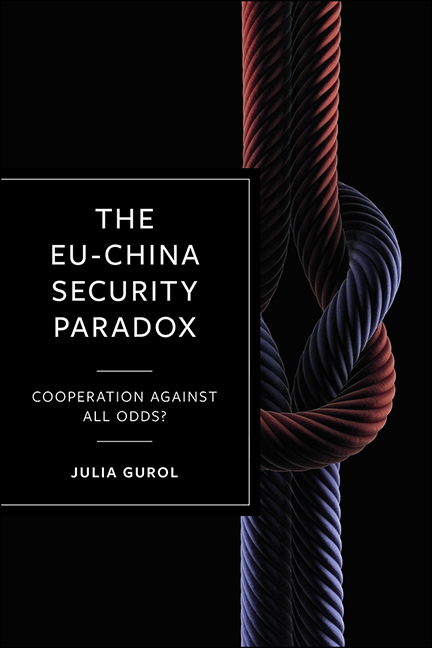Book contents
- Frontmatter
- Contents
- List of Figures
- List of Tables
- List of Abbreviations
- About the Author
- Acknowledgements
- 1 The EU and China in a Changing International Environment
- 2 Analytical Framework: Towards Multidimensionality
- 3 The EU’s and China’s Foreign and Security Policy Principles
- 4 The EU and China on the Global Stage: Interests and Interdependence
- 5 Framing and Perceptions in EU–China Security Relations
- 6 EU–China Relations on Anti-Terrorism
- 7 EU–China Relations on Maritime Security and Anti-Piracy
- 8 EU–China Relations on Climate and Energy Security
- 9 The US: An Elephant in the Room for EU–China Security Relations
- 10 Conclusion and Outlook: The EU and China at a Crossroads
- Notes
- References
- Index
1 - The EU and China in a Changing International Environment
Published online by Cambridge University Press: 15 September 2022
- Frontmatter
- Contents
- List of Figures
- List of Tables
- List of Abbreviations
- About the Author
- Acknowledgements
- 1 The EU and China in a Changing International Environment
- 2 Analytical Framework: Towards Multidimensionality
- 3 The EU’s and China’s Foreign and Security Policy Principles
- 4 The EU and China on the Global Stage: Interests and Interdependence
- 5 Framing and Perceptions in EU–China Security Relations
- 6 EU–China Relations on Anti-Terrorism
- 7 EU–China Relations on Maritime Security and Anti-Piracy
- 8 EU–China Relations on Climate and Energy Security
- 9 The US: An Elephant in the Room for EU–China Security Relations
- 10 Conclusion and Outlook: The EU and China at a Crossroads
- Notes
- References
- Index
Summary
Introduction
Few international actors are presently under such scrutiny as the EU and China. They are undoubtedly two of the most decisive actors in current world politics. As COVID-19 continues to ravage economies globally and with major powers such as the United States finding solace in increased protectionism, more eyes are on the EU and China when it comes to shaping international politics. Yet their relationship with each other is all but straightforward and both struggle with defining their respective roles. China is an important partner for the EU on climate protection and other issues of global governance. However, it is also a competitor in trade and technology and even a systemic rival on issues of governance, values and multilateralism (European Commission, 2019a). It is therefore not surprising that the overall EU–China relationship struggles between efficacious collaboration on the one hand, and profound challenges and recurring skirmishes on the other. In times of a constantly changing international environment, the global pandemic and uncertainty concerning the development of US foreign policy under the administration of Joe Biden, EU–China relations face an uncertain future that is vastly determined by broader geoeconomic and geopolitical developments.
Strikingly, it is the security realm in which the EU and China often manage to set aside contradicting ideological and normative motivations, and establish cooperation against all odds. Although economy, trade and investment policies are still the main drivers of their relationship, security has developed into one of the most vital pillars of EU–China relations. While the economy still dominates the EU–China agenda, the security realm is all but tenuous. Instead, it has risen in significance over time and now complements the economic and political pillars of the bilateral relationship, not only because of the deepening economy–security nexus, but also because of the rise of transnational security challenges such as climate and energy security, maritime security, and food security that equally affect the EU and China. Since 2003, there have been an increasing number of attempts by the EU and China to set their security policies on common ground. This is puzzling as the EU and China follow very different approaches to key principles of foreign and security policy and of interstate relations. Their stances on questions of sovereignty, territorial integrity and non-interference often are diametrically opposed.
- Type
- Chapter
- Information
- The EU-China Security ParadoxCooperation against All Odds?, pp. 1 - 15Publisher: Bristol University PressPrint publication year: 2022



